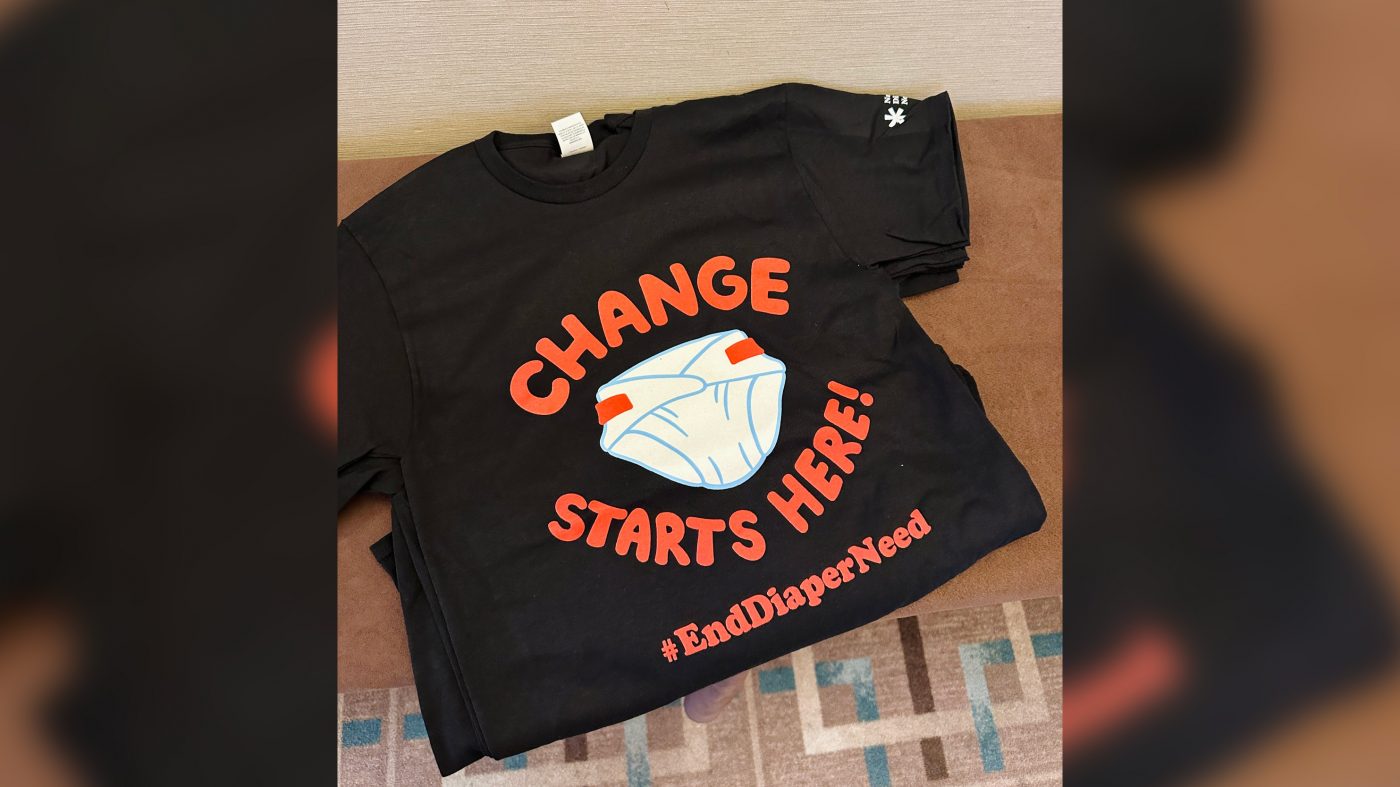Did you know that infants require up to 12 diapers per day? Did you also know this can cost families anywhere from $80 to upwards of $100 per month per baby? For America’s poorest families, that translates to roughly 14 percent of their household income. To make matters worse, the cost of diapers has surged. A package of disposable diapers was roughly $16 in 2019 and now hovers at nearly $22.
Joanne Samuel Goldblum, founder and CEO at the National Diaper Bank Network, believes most policymakers are focused on “the big picture” to address poverty but often neglect the material basic needs that help families get through the day. She identifies aisles in the middle of most supermarkets stocked with hygiene products, cleaning supplies and toilet paper, most of which can’t be purchased via assistance programs, but they can be the difference between economic stability and a descent into poverty. Diapers are not typically on the policy agenda, but they should be.
The National Diaper Bank Network defines diaper need as “the lack of a sufficient supply of diapers to keep a baby or toddler clean, dry and healthy.” Findings from the organization’s latest report, The NDBN Diaper Check 2023: Diaper Insecurity among U.S. Children and Families, shows that diaper need “remains a serious and pervasive issue that impacts the physical, mental and economic well-being of U.S. children and families.” Shockingly, the survey found that nearly half of families (47 percent) reported experiencing diaper need, a drastic increase from the 1 in 3 families that reported diaper need in 2010.
When they can’t provide diapers, parents resort to makeshift solutions such as using plastic bags, towels and T-shirts as diapers, scouring the internet for instructions on how to make a homemade diaper, and reusing wet or soiled diapers after removing waste. These “diaper-stretching” methods to compensate for diaper need can have serious physical consequences, such as severe diaper rash and urinary tract infections.
Diaper need can also have a profound impact on mental health. A soggy diaper is a physical reminder of a child’s unmet need, and not being able to meet that need is a horrible, unshakable feeling. A Connecticut study found that diaper need was the number one predictor of maternal stress, even outpacing worries about paying for food, electricity or housing.
- Pass the End Diaper Need Act
- Eliminate State Taxes on Diapers
- Expand Medicaid to Cover the Cost of Diapers
Diaper need also has economic consequences. Most child care centers require parents to supply a day or even an entire week’s worth of diapers at once, even if the cost of child care is subsidized. If families do not have the required supply of diapers, they must find another child care arrangement, which often means missing work. Twenty-five percent of families with diaper need who were included in the Diaper Check survey reported missing work or school because they did not have enough diapers to place their baby in child care. On average, these parents missed about five workdays per month, which equates to a loss of $296 for those earning the federal minimum wage. That loss of income can keep families in a vicious cycle of poverty. “If you don’t have a diaper and you can’t bring your kid to child care, you can’t go to work, and if you can’t go work, you can’t afford the things you need for your child. That’s true of all sorts of material, basic needs,” said Goldblum.
The National Diaper Bank Network has about 250 member banks in its network, with locations in every state, plus Washington D.C. and Puerto Rico. Collectively, the network has distributed over 1 billion diapers since 2011. While some diaper banks distribute diapers to families directly, others operate on a partner model. These diaper banks work with organizations, such as food banks, to ensure families have a one-stop shop to access what they need without traveling to various locations.
Nakeisha Wells founded the Diaper Bank of Greater Cleveland in 2019 after discovering that there were no existing diaper banks in Cuyahoga County despite being Ohio’s second most populous county. The organization aims to fill a critical gap in its community and has partnered with the Greater Cleveland Food Bank to distribute essentials to families directly out of a new resource center. The center sees 200 to 250 families daily, and Wells estimates that 8000 diapers are distributed per month just at that location. The Diaper Bank of Greater Cleveland surveys families every month. In survey responses shared with Early Learning Nation, every parent reported that the number of diapers they received from the Diaper Bank of Greater Cleveland helped them reduce stress and keep their child healthier. Parents also shared that distributions from the diaper bank helped them pay bills, go to work, purchase groceries and buy non-food items like toothpaste or soap.
Emergency Infant Services is a nonprofit that has served the Tulsa community for over 40 years and helps families access essentials like diapers, wipes and formula. Jacky Escobedo, the organization’s director of social services, is proud of the “low barrier process” that allows Emergency Infant Services to make a significant impact. There are no income requirements to get help, and volunteers and staff members rely on conversations with families to assess how they are doing, identify what needs can be met in-house and determine how they can be connected to additional resources. This year alone, Emergency Infant Services has seen close to 29,000 families and has distributed over 1 million diapers.
Diaper banks experienced an unprecedented demand during the COVID-19 pandemic. The National Diaper Bank Network estimates that the need for diapers in communities across the country increased by 200 to 600 percent. Today, much of that demand still lingers, and diaper banks are finding it challenging to keep up. Since February, the number of clients at the Diaper Bank of Greater Cleveland’s weekly diaper distribution has tripled. On any given day, 20 to 30 families are lined up before their doors even open. This year, Emergency Infant Services has seen double the number of families they usually help.
Many have theorized about ways to address unprecedented diaper need, but some solutions are misguided. Policymakers have suggested expanding food-based and nutrition programs like SNAP or WIC to cover the cost of diapers, but the National Diaper Bank Network is not in favor of this option. According to Lacey Gero, director of government affairs at the National Diaper Bank Network, SNAP and WIC are already under constant threat of spending cuts and these programs will not receive an influx of funding to provide additional support. More than a quarter of families with diaper need surveyed in Diaper Check already report skipping meals to afford more diapers. With SNAP or WIC expansion, families would still be forced to make impossible decisions about providing for their basic needs with limited resources: do I provide food for my children this month, or are diapers more important? Families would also continue to rely on community resources, such as food banks, to provide whatever they cannot cover on their own, which strains an already fragile system.
Others have suggested that families who struggle to afford disposable diapers should switch to cloth diapers. According to Goldblum, “The problem with diaper need is not disposable versus cloth,” and it is “simplistic to say that [cloth diapers] are the answer.” She added that more than 90 percent of American families use disposable diapers, and the vast majority of child care centers require them. Cloth diapers also demand washing machines, and heavy-duty washing machines at that, to adequately clean them. However, many Americans who struggle financially do not have their own washing machines, and in most laundromats, cloth diapers are not allowed. While cloth diapers may be a trusted option for some, they are not a feasible solution for many families.
Still, many people shame families experiencing diaper need and reject efforts to address this crisis. Rush Limbaugh, a late conservative talk show host, made a mockery of legislation introduced by Rep. Rosa DeLauro in 2011 that would have provided federal funding to supply child care centers with diapers to help families who could not afford them. Limbaugh said the proposal “gave a new meaning to the term pampering the poor.” Others have echoed similar sentiments and often ask, why have children if you cannot afford them? The question itself reflects just how poorly our nation treats those experiencing poverty. Wages have remained stagnant while the cost of living and prices of basic necessities have skyrocketed, an obvious mismatch according to Goldblum. It is no surprise that families are struggling to afford diapers. What else do we expect?
As the Diaper Check revealed, it is not just low-income parents who experience diaper need. This problem cuts across income levels and is present in every community. More than a quarter of families who experience diaper need are classified as middle-income. These families often fall through the cracks because they earn too much to qualify for federal assistance programs but still struggle to afford the cost of basic necessities. Most parents who experience diaper need are employed, many with multiple jobs. Goldblum asserts, “If people are working and they can’t afford to take care of their family, that’s a societal problem and not an individual problem.”
Half of American families cannot afford enough diapers to keep their children clean, dry and healthy. This crisis is too big to be solved by diaper banks and kind-hearted volunteers alone. The millions of families who experience diaper need require policy solutions, not condemnation or empty platitudes.
To learn more about the National Diaper Bank Network, click here. To support the Diaper Bank of Greater Cleveland, click here. To support Emergency Infant Services, click here.

Elise Anderson
Elise Anderson is a recent graduate from the Department of Urban Policy and Planning at Hunter College where she earned her M.S. in Urban Policy and Leadership. She is also the Communications Manager at Vote Mama, the leading source of research and analysis about the political participation of mothers. Anderson worked previously as a congressional press secretary and campaign manager, and has a passion for policy and supporting working families.



